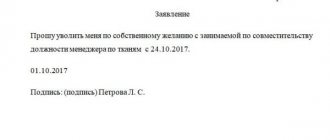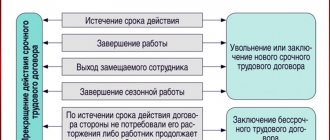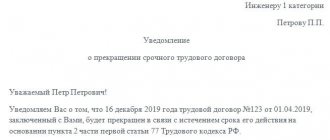Last modified: January 2021
The time of dismissal does not always fall on a person’s working day. Sometimes circumstances are such that on the day of the upcoming termination of the contract, the employee falls ill and cannot be present at the workplace. Depending on who takes the initiative, dismissal during sick leave takes place differently. The problem is not only the fact of a person’s absence, but also the complexity of calculating the last payment, including sick leave.
The law, while prohibiting the dismissal of an employee who is on sick leave (Article 81 of the labor legislation), does not establish prohibitions for the employee to leave at his own request. If, in the procedure for terminating a contract with an employee, dismissal on sick leave is revealed, such a case is subject to challenge in court, followed by reinstatement and payment of compensation for the entire missed period.
Legal regulation
The entire range of labor relations is regulated by the Labor Code. If a person starts to get sick and takes sick leave, then you cannot fire him. Even if a person worked poorly and committed violations of labor discipline, termination of the contract is prohibited.
Sick leave and simultaneous dismissal are incompatible. The rule is established by Art. 81 of the Labor Code.
Important! It is permissible to terminate a contract during a period of incapacity if the enterprise is liquidated or a private entrepreneur ceases its activities.
The situation regarding voluntary dismissal is resolved completely differently.
Is it possible not to work for 14 days?
- Check to see if you are one of those citizens who has the right not to notify the employer of dismissal in advance.
Not all employees must work two weeks upon dismissal. There is no need for testing if:- a pensioner or a pregnant woman quits;
the employee is caring for a disabled child;
- an employee moves to another city;
- his/her husband/wife is transferred to another area to work;
- the employee cannot continue to work due to illness or medical reasons;
- he is enrolled in an educational institution.
In all of the above cases, documentary evidence is required that mining is impossible.
The following categories of workers are also not required to work two weeks:
- those who are on probation work only 3 days (Article 71 of the Labor Code of the Russian Federation);
- who has an employment contract for less than 2 months (Article 292 of the Labor Code of the Russian Federation);
- employed in seasonal work (Article 296 of the Labor Code of the Russian Federation).
The law allows the employer, by agreement with the employee, to dismiss him before the expiration of the working period. This is possible both upon dismissal by agreement of the parties (Article 78 of the Labor Code of the Russian Federation), and upon dismissal at the request of the employee (Article 80 of the Labor Code of the Russian Federation).
If the employer does not need you to work at his company for another 14 days, then it is likely that he will agree and you will be fired on the same day. To do this, talk to an authorized employee and indicate in your application the desired date of dismissal.
Cases of violation of an employee’s labor rights are not uncommon: changing his work schedule without familiarization with signature within the time limits established by law, changing the nature of work, conditions of payment without signing an additional agreement with the employee, i.e. unilaterally.
In all these cases, the employee has the right to resign without working, but in the application you need to motivate this and collect documents that can confirm your position in court.
An employee who has vacation days left that he did not have time to take off can write an application for annual leave with subsequent dismissal.
You must understand that the employer can always verify the authenticity of a sick leave certificate by making a request to the medical institution that issued it. Therefore, the certificate of incapacity for work must be issued in compliance with all norms and rules. Otherwise, problems will arise for both the medical institution and the employee. You can apply for sick leave to care for a child. Read more about whether it is possible to go on sick leave followed by dismissal without working time.
Termination of employment at the request of the employee
It happens that a person writes a letter of resignation, and then begins to get sick. Then the contract is terminated according to the usual procedure. The contract was terminated on the date indicated in the application. There will be no delays.
The issue is resolved in a similar way if an employee writes a letter of resignation and falls ill. When to fire if the contract is terminated by agreement of the parties?
The boss will have to wait until he is discharged from the hospital if he wants to fire his subordinate. Termination of the contract is possible, but only after the ballot ends.
When the specialist closes the bulletin, the HR employee will write all the necessary information in it. Then an order is issued and an entry is made in the work book.
On the day of dismissal and not a day later, a full settlement must be made with the person; no debts should remain. If the funds are not transferred on the day of dismissal, the employee will have the right to receive wages and penalties for each day of delay.
Dismissal by agreement of the parties
Dismissal is allowed not only at the initiative of the manager or employee, but also by agreement of the parties. In this case, one of them sends a notice to the second with a proposal to discuss the conclusion of an agreement. The document must indicate the date of departure and essential conditions: payment of compensation, etc. The employer can either assign two weeks of work or cancel it.
Dismissal documents must be prepared on the day specified in the agreement. If at this moment the resigning employee falls ill, the employment contract will still be terminated. To prevent this from happening, it will be necessary to conclude an agreement to cancel the previously drawn up contract. This is only possible with the consent of the employer, otherwise the employee will be dismissed in any case.
If there is an agreement, the date of dismissal is considered to be the day specified in it. If the sick leave is not closed at this time, all days subsequent to termination are fully paid.
Important! The first three days are paid from the employer's funds. The subsequent period of incapacity for work is compensated by the Social Insurance Fund, but the company is responsible for transferring funds to the dismissed person.
Difficult situations
It happens that a person falls ill and submits a letter of resignation. In such a situation, managers are often interested in extending the working period. But management has no right to force a person to work extra days. Two weeks may pass while a person is sick, and there will be no need to work extra time.
You can also safely terminate your contract while on vacation. The time spent in the office will not be extended.
2 possible situations upon dismissal:
- A person writes a statement, and after one week issues a sick leave. Dismissal dates do not shift if the person manages to go to work and close the ballot before the end of the work period.
- The person is ill, the document on incapacity for work is not closed. The contract is terminated on the date written in the application. The deadlines remain the same. The time during which the person could not work is paid.
What if you extend your vacation?
Some employers believe that in this situation the employment contract is valid until the end of the vacation, since annual leave in the presence of sick leave is extended by the number of days of illness (Part 1 of Article 124 of the Labor Code).
At the same time, if the employer has already made a record of dismissal in the work book before the start of the vacation, corrections are made in it, and compensation is also calculated for unused vacation days in connection with the recalculation of insurance and days of work under the employment contract.
But with this approach, labor disputes are not excluded, since it is impossible to unilaterally extend the employment relationship with an employee: the employer thereby violates the employee’s right to freedom of work (Article 37 of the Constitution of the Russian Federation).
A way out of the situation may be to obtain the employee’s written consent to extend the vacation and postpone the dismissal to a later date.
Procedure for payment of time of incapacity for work
Sometimes the following situation arises: an employee decided to quit and then went on sick leave.
What will be the payment procedure in this case? The employer will have to pay for the ballot if the employee was working for the company when it was opened. Moreover, payment is made for the entire time of illness. Former employees also have to pay. Payment is made if the illness begins within thirty days after dismissal.
Sick leave is paid in the amount of sixty percent of wages.
3 design examples:
Example 1. Kuznetsov N.A. worked as a manager. Quit. Fifteen days later I fell ill with a sore throat. I contacted my local doctor and drew up a document on incapacity for work. The employer will have to pay. Money is transferred over a period not exceeding thirty days. If the illness continues beyond this period, there will be no payment.
Demands for payment are legal if the employee makes them no later than six months from the date of termination of the contract.
Example 2. Ledentsova I.S. worked as a secretary of the Moscow District Court. The girl resigned from her position. Two weeks after the contract was terminated, I fell ill. I created a newsletter. She brought the document to the personnel service only four months after her dismissal.
Question: Do I need to pay for sick leave for a former employee?
Answer. Yes, it is necessary, despite the fact that before her dismissal, her sick leave was not received by the personnel department. A resigning specialist has the right to present a document for payment no later than six months after his departure. In our example, the deadlines were met. So, questions about whether it is possible to receive payment for sick time after dismissal are resolved in favor of the employee, the main thing is to comply with the deadlines for the application.
Can an employer refuse and what to do in this case?
The employer can compensate sick leave in full, in part, or refuse. Only partially when:
- the injury was sustained under the influence of drugs or alcohol;
- the patient did not come for examination at the appointed time;
- violated the hospital regime, about which a corresponding note was made on the sheet.
The employer has the right to refuse if:
- the sick leave certificate is fake or closed in a different institution than the one that issued it;
- deadlines for provision were missed without good reason;
- the injury was intentionally caused by the employee himself;
- the employee is under administrative or criminal arrest.
If an employer refuses to pay sick leave, he violates the Labor Code of the Russian Federation and falls under administrative liability. The employee should contact the labor inspectorate of the area or the court.
An employee who performed his work duties without complaints and was registered in accordance with the Labor Code of the Russian Federation may qualify for sick leave pay during vacation with subsequent dismissal. The procedure for providing payment is determined by law and differs from the sequence of processing compensation provided for by law in other cases.
Didn't find the answer to your question? Find out how to solve exactly your problem - call right now:
An employee of an enterprise can get sick at any time - during work and during vacation, and each time he is paid differently. Calculations of payments for temporary disability are always calculated on an individual basis, depending on the average salary, the time of sick leave, the number of sick days in the current billing period, the type of sick leave, and so on.
Let's find out by what rules sick leave is issued and paid during vacation followed by dismissal.
- What are the features of sick leave during vacation followed by dismissal?
- An example of how sick leave is issued during vacation followed by dismissal
- How is sick leave processed during vacation followed by dismissal?
- How is sick leave paid during vacation followed by dismissal?
- Legislative acts on the topic
- Common mistakes
- Answers to common questions about sick leave during vacation followed by dismissal
Sanctions for violations
Liability for violations is established by the Code of Administrative Offences. An employee can seek protection of his rights from labor inspectors, the prosecutor's office and the court.
If the court confirms that there were violations, the employee will be reinstated, and the company will compensate for lost earnings.
Social guarantees are provided by the Labor Code of the Russian Federation. A person can exercise their right to rest and submit a resignation letter at the same time. The rule also applies to cases when a woman takes sick leave to care for a child. In any case, the contract is terminated on the date specified in the application.
Social guarantees do not depend on the reason for registering a ballot. A person can be fired both during his illness and while caring for a sick family member.
How to quit on sick leave without working off
The most preferable option, when a quitter intends to leave without working the required period, would be to submit an application 1 day before the opening of a certificate of temporary incapacity for work. Upon completion of treatment, dismissal occurs on the last day of sick leave.
- How to quit without working for two weeks: options when it’s necessary
There are other circumstances when working 2 weeks makes no sense. This is what they do when a company is liquidated, when management is forced to say goodbye to all employees without exception. They lose their place of work even on sick leave, according to clause 1, part 1, art. 81, and the basis will be a preliminary written notification of the person about the upcoming closure (the notification period is a couple of months before the liquidation, according to Article 180 Part 2 of the Labor Code of the Russian Federation).
If the termination of the contract is formalized during the period of open leave, upon recovery, the employee applies to the Social Insurance Fund with a request to compensate for the period of illness with an insurance payment. Compensation must be paid within 10 days.
When separation is initiated by the administration of the enterprise, but after making this decision the person opens a certificate of incapacity for work, the period for recording this time in work is suspended, and after recovery the person retains the required days of work.
In some circumstances, work off is not provided and does not require agreement with the employer, regardless of the availability of open sick leave.
Such situations include:
- Change of place of residence with moving to another region or city.
- Transfer to the service of a spouse (for family).
- Worker pregnancy.
- Presence of contraindications from doctors.
- The need to organize care for a disabled child.
- Retirement.
While on sick leave, the employee writes a statement and continues to be absent from the workplace, and dismissal will take place on the day designated as the date of termination of the employment contract. Being at the workplace is required only in situations where the sick leave ends and there are no more reasons for absenteeism.
Summary
- The Constitution and the Labor Code guarantee the prohibition of forced labor. Therefore, a person can resign from office whenever he pleases. There are no obstacles.
- You can resign while on vacation or during illness.
- If sick leave is issued, then we resign on a general basis. Dates are not transferred.
- If you leave your position, you can still get money. Payment is made if you have time to apply no later than six months after dismissal.
- When a person leaves work, the ballot is paid for a period no later than thirty days from the date of termination of the contract.
- The documents are drawn up so that the employee leaves her position on the date indicated in the application. The working time is not extended when a document on incapacity for work is issued.
Dismissal while on sick leave
There are often cases when, for one reason or another, it is necessary to terminate the employment relationship with a worker, and this can also happen while the employee is on sick leave. In such a situation, how can one properly dismiss a worker and accrue the required compensation payments?
Resigning during sick leave at our own request
An employee may terminate his employment relationship with the employer on his own initiative by notifying him of this in writing at least 2 weeks before the day of dismissal. This period begins to count from the next day after the employer is notified of dismissal (Article 80 of the Labor Code of the Russian Federation). If an employee goes on sick leave during this two-week period, then his illness does not act as an obstacle to dismissal. The same applies to termination of employment relationships by agreement of the parties.
Important! During illness, the employee will be dismissed on the day specified in his application without additional work (letter of Rostrud No. 1551-6 dated 09/05/2006) and the employer cannot independently make changes to the date of dismissal. The employee himself has the right to do this - he can cancel the application or write another date while on sick leave.
This procedure is carried out by mail, for example, if an employee cannot come to work due to illness. When the employee recovers before the date of dismissal, then it occurs in accordance with the application.
If on the day of dismissal the employee is on sick leave:
- the employer in the dismissal order indicates that he cannot inform the employee of the contents of the document and record his signature, because he is on sick leave;
- the employer must send the employee a notice of the need to receive funds (salary, required compensation, allowances, additional payments), as well as a work book or obtain permission to send it by mail (Article 84.1 of the Labor Code of the Russian Federation). Starting from the day of sending such notice, the employer is not responsible for the late receipt of the work book by the employee.
Important! The work record book must be received by the employee on the day of dismissal specified earlier in the application. If he is temporarily disabled, then paragraph 2 above applies.
An employee may resign on his own initiative while on sick leave. He has the right to send the application to work by mail or take it himself if his health condition allows.
Thus, the 14 days that the employee must work in connection with dismissal will pass during his sick leave, if the period of illness exceeds these two weeks, otherwise the employee will spend the rest of the work period at work. The employee must immediately and can bring the certificate of incapacity for work (sick leave) issued by the medical institution to work after dismissal in order to receive temporary disability benefits.
Dismissal on sick leave at the initiative of the employer
Following Art. 81 of the Labor Code of the Russian Federation, the employer does not have the right to terminate the employment relationship with an employee on his own initiative when he is on sick leave or on vacation.
This can only be done under the following exceptions:
- upon liquidation of the organization;
- when closing the IP.
When the termination of an employment contract is carried out at the request of the employer and the employee is on sick leave that day, then it will be necessary to wait until he returns from sick leave to formalize the dismissal. Dismissal may occur on the first day of release. This also applies to dismissal as a result of staff reduction.
Important! If an employee is on sick leave for a long period and there is no one to work with, then the employer can employ another person under a fixed-term employment contract (Article 59 of the Labor Code of the Russian Federation), maintaining the wording “until the main employee leaves.”
Payments for temporary sick leave (sick leave)
Sick leave benefits are accrued to employees both during the employment relationship and when this relationship is terminated (Article 5 of Law No. 255-FZ of December 29, 2006).
1) If sick leave (sick leave) was opened after dismissal. This means that the person fell ill after his dismissal. For example, the date of dismissal is April 15, and the certificate of incapacity for work says “I was in the hospital from April 18 to May 3 inclusive,” i.e., April 18 is the opening day of sick leave, and May 3 is the day it closes:
The employer under such sick leave is obliged to pay the resigned employee if he fell ill within 30 calendar days from the date of dismissal - in this case, he fell ill on the 3rd day after dismissal, and the duration of the illness and the reason for leaving do not play a role.
The payment is made at the last place of work for the entire period of illness from the first to the last day (exceptions – Part 3, Part 4, Article 6 of Law No. 255-FZ) and is 60% of average earnings (Part 2, Article 5, Part 2 Article 7 of Law No. 255-FZ). The initial 3 days are paid by the insurer (i.e. the employer), the rest - by the Social Insurance Fund.
The benefit is assigned if the employee applied for it no later than 6 months from the date of restoration of working capacity (Part 1, Article 12 of Law No. 255-FZ). In the case described above, the day of restoration of working capacity is considered to be May 4, we count 6 months from May 4 - November 4 is the last day on which the employee can apply for benefits.
If this period was missed by the employee for valid reasons that have evidence, then the decision to accrue benefits rests with the territorial body of the insurer (FSS) - Order No. 74 of January 31, 2007 of the Ministry of Health and Social Development of Russia. The same body pays benefits in case of closure of an enterprise or lack of money in its current accounts. Working part-time, the employee will receive benefits for each place of work or for the last of them (Article 13 of Law No. 255-FZ).
Important! When will the employee receive benefits? The employee will receive the sick leave benefit accrued by the accounting department on the day the salary is issued - this is either the day of full payment of the salary, or the day of the advance payment in the organization (IP), so on the nearest of these days the employee will receive the money minus income tax.
2) Sick leave was opened before the termination of the employment contract:
In this situation, the benefit is calculated and paid from the beginning of the sick leave to the day it ends, inclusive, in the same amount as if there had been no termination of the employment contract, i.e. full. The basis for accrual and payment is a correctly executed sick leave certificate.
Important! Payment for sick leave opened during the period of the employment contract is made on a general basis even when the worker quits by the date of its closure.
When calculating benefits, the employee’s insurance length is taken into account (Clause 1, Article 7 of Law No. 255-FZ)
| Insurance experience, years | Amount of payments as a percentage of average earnings |
| 8 or more | 100% |
| from 5 to 8 | 80% |
| up to 5 | 60% |
Reasons for termination of an employment contract
When applying for a job, a new employee enters into an agreement with the organization, which is regulated by the provisions of the Labor Code of the Russian Federation. Termination of this agreement may occur for various reasons:
- at the request of the employee;
- at the initiative of the employer;
- by agreement of both parties;
- due to circumstances beyond the control of both parties;
- when moving to a new position;
- in case of violation of the rules of the employment contract;
- upon expiration of the contract.
The most convenient option for both parties is mutual consent. In this case, the employee and manager can enter into an agreement that will be beneficial to both. Usually, in this case, the employee receives additional payments, and the employer guarantees that the agreement will not be canceled or challenged due to changed circumstances in the employee’s life.
Dismissal for inadequacy of the position is a rare option, as it is often difficult to prove.
An employee who does not show up for work may subsequently bring sick leave, in which case he will not be counted as absenteeism. Professional unsuitability can only be revealed in the event of a general certification that meets the requirements of the law.
Expert opinion
Lebedev Sergey Fedorovich
Practitioner lawyer with 7 years of experience. Specialization: civil law. Extensive experience in defense in court.
The most common is leaving work of your own free will. Sometimes, even in the case of serious violations, the employer gives the person the opportunity to write a statement on his own so that dismissal under the article is not recorded in the work book.
But more often a person simply finds another, higher-paying, prestigious or convenient vacancy or moves.
Sometimes the reason for dismissal is reluctance to work under new management, unpreparedness for business trips, changes in working conditions, or deteriorating health.
After the written application, a two-week work period follows , but often people try to reduce it or avoid it altogether. Since sick leave is included in service upon dismissal, sometimes it is taken so as not to return to the place of duty. But before making hasty decisions, you need to know how many days you are supposed to work in different situations.
Results
Working off is considered to be the period between the date of filing an application for voluntary dismissal and the date of actual termination of the employment contract. There is no such concept in the law; there is only an employee’s obligation to notify his employer of his upcoming dismissal two weeks before the desired date. Therefore, the norms of the Labor Code of the Russian Federation make it quite clear that sick leave during dismissal does not affect the desired date of entry in the work book.
The article talks about if an employee wrote a letter of resignation and fell ill, when to fire, and explains other subtleties of the law.
Calculation of sick benefits
Sickness benefits are calculated using the following algorithm:
Step 1: A sample of wages is taken for the previous two years. If the employee did not work for this organization for these two years, then when applying for a job he had to provide certificate 182n, which indicated the amount of salary at the previous place.
Step 2: Add up the earnings for two years, then divide by 730 or 731 days (the number of days for two years), we get the average daily earnings to calculate the benefit itself.
Step 3: Next, you need to know your completed insurance period. It lets us know whether sick leave will be fully accrued, that is, 100%, 80% or 60%. We multiply the average daily earnings by the percentage received and get the amount with which the benefit itself will be calculated. For example, the salary for two years was 200,000 rubles/730 days. = 273.97 rub. If the experience is less than five years, then the percentage will be 60%, from five to eight - 80%, if more than eight years, then 100%.
Free legal consultation
We will answer your question in 5 minutes!
Free legal consultation We will answer your question in 5 minutes!
Call: 8 800 511-39-66
Ask a Question
Step 4: Next 273.97 rubles * 80% = 219.18 rubles, then multiply this amount by the number of days on the certificate of incapacity for work and get the benefit amount. Moreover, the first three days of sick leave are paid at the expense of the employer, and the rest at the expense of the social insurance fund. The employee will receive sick leave pay minus income tax. If, for example, an employee was ill for 10 days, then in our case the amount of accrued benefits will be 2190.18 rubles. He will receive 285 rubles minus income tax. — 1905.18 rub.
Step 5 : When an employee is dismissed according to all the rules, he must receive a salary certificate in the accounting department in form 182n to provide it to his next place of work. He is also given a work book. If the person who resigned is unable to come, due to illness, to pick it up, then he leaves written permission to send the book by mail. The final payment is transferred to the card within three days from the date of signing the dismissal order, and the benefit will be paid after the immediate calculation of the sick leave itself.










